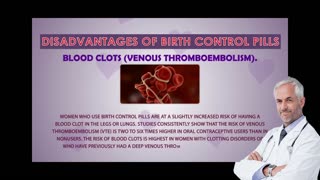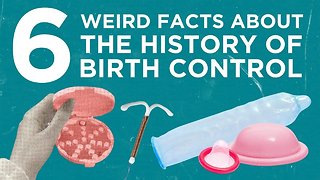WATCH: Contraception myths and facts
Myth 1: The contraceptive pill/birth control pill is effective immediately after taking it.
Fact: It is important to take you birth control as prescribed by your healthcare provider. Sr Deborah Stander works at the Ravensmead Community Day Centre provides counselling to young men and women on the use of contraceptives. She shares the importance of taking your pill the right way. “For pregnancy prevention, the contraceptive pill needs to be taken every day at the same time. For the suitable family planning method for you, please contact your nearest clinic.”
Myth 2: Contraceptives, like IUDs, are responsible for infertility.
Fact: Also known as a ‘loop,’ an intrauterine device (IUD) is a small device shaped like a "T" that fits inside your uterus. There are two types of UIDs: copper and hormonal, which prevents sperm from reaching the egg. Sr Bongiswa Mazeke, from the Michael Mapongwana Community Day Centre says it cannot cause infertility. “Contraceptives like IUDs are very effective, and they last for 3-5 years. These contraceptives do not cause infertility. A female can fall pregnant immediately after removing an IUD. After inserting the IUD, it is important for female clients to come for two check-ups, one at 6 weeks and another after 1 year.”
Myth 3: Contraception is a woman’s responsibility.
Fact: Some women may be afraid to speak to their partners about contraceptive methods. Maylene Reid, Professional Nurse in the Overberg District, says contraception is everyone’s responsibility. “Women are often scared to speak to their partners about contraceptives, but women and men have an equal responsibility to use contraceptives to protect themselves from HIV, STIs and unwanted pregnancies. If you are male speak to your healthcare provider about medical male circumcision, vasectomies, and the use of condemn to protect yourself and your partner.”
Myth 4: You don’t need to use other forms of protection if you’re on the pill.
Fact: Remember, you need to use a condom every time you have sex to protect yourself from sexually transmitted infections, as the pill cannot protect you from contracting an STI. This is why “double protection” is important. “Double the protection means double the safety against STIs, including HIV. We encourage dual protection – using condoms while using other contraceptives, like the pill, too – to ensure good reproductive health for you and your partner,” says Sr Roseanne Love, nurse in the Matzikama Sub-District, in the West Coast.
Myth 5: I can’t become pregnant while breastfeeding.
Fact: It is possible to get pregnant while breastfeeding. The good news is that you can protect yourself from unplanned pregnancies. Professional Nurse, Sr Judiac Ranape works in the Southern and Western District. Sr Ranape explains why it’s possible to become pregnant while breastfeeding. “It is possible to get pregnant while breastfeeding. When breastfeeding exclusively, it is less likely for a woman to ovulate until she starts to wean the baby from the breast. When breastfeeding is supplemented with formula or solids, even when the period has not returned yet, and there is no contraceptive protection, the woman can fall pregnant. To prevent pregnancy while breastfeeding, it is best to start another form of contraception soon after delivery even if you are breastfeeding.”
Myth 6: I can take my morning after pill at any time.
Fact: Like the daily oral contraceptive, it’s important to take your emergency pill or morning after pill as advised by your healthcare provider. Sr Tandiswa Kami, the Operational Manager at Gugulethu MOU, says the emergency pill can prevent unwanted pregnancies. “Prevent unwanted and unplanned pregnancies by using the emergency contraceptive knowns as the ‘morning after pill’. Remember to take it within the 72 hours of having unprotected sexual intercourse. Come and get yours for free at our primary health care (clinic) facilities. Ask one of your healthcare providers where to access the morning after contraceptive.”
-
 1:16
1:16
IOL-IndependentOnline
1 year agoWATCH: Contraception myths and facts
69 -
 0:55
0:55
DPF
7 months ago $0.01 earnedExploring Modern Birth Control: Advancements, Options, and Considerations
56 -
 5:07
5:07
WTMJMilwaukee
6 years agoEmergency Contraceptives Fact vs. Fiction
6 -
 2:55
2:55
Health Education
6 months agoDisadvantages Of Birth Control Pills _ AAI Rejuvenation Clinic _ Health Education
118 -
 2:55
2:55
Health Education
6 months agoDisadvantages Of Birth Control Pills _ AAI Rejuvenation Clinic _ Health Education
96 -
 9:17
9:17
PBS
5 years ago6 Weird Facts About the History of Birth Control
5 -
 10:23
10:23
Pharmacist_Michael
10 months agoExposing Menopause Myths | Get the Facts!
15 -
 4:18
4:18
wslawclinic
10 months agoDebunking 6 Common Myths About Women’s Health
9 -
 6:10
6:10
STLNutritionDoc
1 year agoPart 1 - Women's TRUE Reproductive Health
25 -
 4:01
4:01
Universe of Reviews
11 months agoPregnancy Miracle Review. Is the #1 Best Selling Infertility Cure Ebook Works?
265